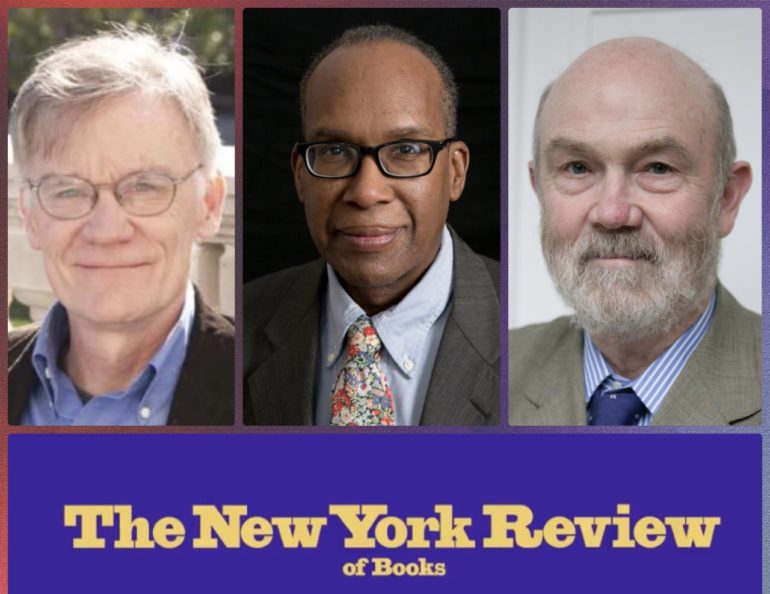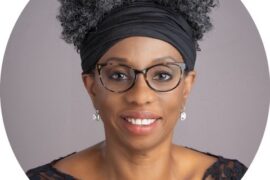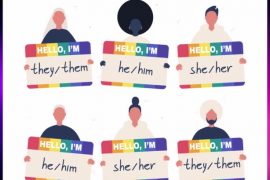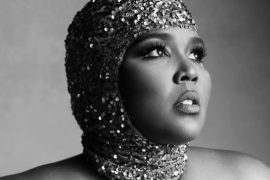The New York Review of Books asked 18 writers to comment on what’s at stake this November in its pre-election edition dated Nov. 5, 2020. Each member of this high-powered panel of progressive thinkers offered his or her unique take, yet all were emphatic in their severe disappointment with current U.S. leadership … or lack thereof.
Some were downright scary.
Yale historian Dave Blight argued: ”We are about to experience a presidential election, perhaps the first since 1860, when it is possible that millions on each side will not find defeat acceptable. … We are essentially two political tribes fighting a cold civil war that may determine whether or not our institutions can survive the strife fomented by a pandemic, racial reckoning, the death of a transcendent Supreme Court justice, and the re-election campaign of our homegrown authoritarian president.”
In preparation for this election, Blight asserts, the incumbent and his lieutenants have dragged up “voter ID laws, reduced polling places and days, felon disenfranchisement, voter roll purges, restrictions on mail- in voting, an evisceration of the Voting Rights Act of 1965 and a constant rant about ‘voter fraud’ without evidence.”
“The Republican Party has become a new kind of Confederacy,” argues Blight. “It has weaponized the truth and rendered it oddly irrelevant. It has brought us almost to a new 1860, an election in which Americans voted for fundamentally different versions of a pro-slavery or an anti-slavery future”
Others in the New York Review of Books assembly worry about why the Russians favor Donald Trump and why does he let them? National security writer Thomas Powers suggests that, if Trump loses, he ought not have access to classified information as have previous former presidents. He argues Trump’s relationships with Russian oligarchs, banks, intelligence agents and Vladimir Putin are thatsuspect.
Black author and essayist Darryl Pinckney reminds that the Proud Boys and other militarized ultra-right groups are readying themselves while too many voters and non-voters take it for granted that everything will work out. But how can they be complacent about an administration that has put a muzzle on the Center for Disease Control (CDC) in the midst of a pandemic?
Benighted Believers

Nothing drives the polarization home as much as the cult-like craze of some of Trump’s supporters. The New York Times devoted its entire Sunday Oct 18 opinion section to examinations of Trump’s damage to the democracy. Yet true believers like John L. Schilling, a Pennsylvania retiree, reacts in a subsequent letter-to-the-editor: “I find that Mr. Trump honestly connects with us people more than any other president since Ronald Reagan. He has done much that was beneficial for the country with little positive coverage from the media and despite considerable obstruction. When he speaks, he speaks to us not over our heads in platitude or political speak. He produces results and runs the country well.”
That kind of groundless misperception is un-deserving of comment, other than to say it demonstrates a complete addiction to the lies the president sells. The fraught question of the moment is how many Mr. and Mrs. Schillings are still out there?
According to the Pew Research Center there are now 30 million Blacks and 30-plus million Hispanics now eligible to register and vote. In 2008 63.6 % Black voter turnout went on to elect Obama with turnout being 61.6% in 2016. One in 10 will be generation Z (Americans who will turn 18-23 next year). Consequently the eligible voters will be younger and more diverse.
It’s possible that the stars will align to bring a Joe Biden victory. But a number of things have to happen: Black voter turnout will not yield to suppression; state governors will honor their oaths and bring out the National Guard, if necessary, to combat the Proud Boys, Boogaloo Bois and Oath Keepers bent on intimidation; transportation will be provided to reach newly-distanced polling places; and the social distancing and masking required by various pandemic protocols will not deter voters.
The Health Factor

Regardless of who wins the election, one thing is certain. The coronavirus will remain a serious threat to the country and African Americans will continue to be victims of its wrath. It has been well documented that Blacks comprise an outsized percentage of those infected and deceased.
So let us take a slight detour from election boulevard to survival street. Coronavirus will be felt by African Americans for decades to come. Blacks have been hit with many social setbacks, it’s true, but trying to improve Black health in the midst of a global pandemic, of resurgent racial turmoil and of this screwy election? That’s unheard of!
I have advanced on these pages that the mistrust Black people have for any vaccine, coupled with the inability to include African Americans in ongoing scientific trials, will make for a long time before we overcome this pandemic and its after-effects. Moreover, the sheer logistical complexity of vaccine distribution will push its availability many months away. Even if we have a change in the White House, the pandemic will continue to threaten and injure Black people disproportionately.
Coronavirus has been a moving target since it was first identified. Just as we’ve learned that many parts of the body are points of vulnerability during the virus’ active phase, we’ve found that many symptoms linger for weeks or months even after tests come back negative. The good news is that there is much that can help one feel better. However, this requires continued access to health care … and that begins with good information.
Healio.com, a valuable health information website, reports on a meeting of minorities in cancer research. At an AACR forum Dr. John D. Carpten discussed the killing of George Floyd and its psychological effects on the Black community. He describes the weeks following Floyd’s death as emotionally, spiritually and psychologically draining. The virtual meeting of the AACR group illustrates just how far Black health care is behind, further demanding immediate and continual attention.
The monthly online journal Nature Medicine (nature.com/nm) also reported on a recent event with useful action items. An August posting describes a meeting of health professionals discussing how racism and police brutality affect the lives of Black patients. Physicians share how to discuss racism with their patients and how physicians and their organizations can work toward health equity. Their overriding conclusion: Black people need us now.
One way to help eliminate racial disparities in health care is to address the social determinants of health – the conditions of places where people reside, learn, work and play. The focus should be on equity as individuals may require different resources and tailored services to live the healthiest lives possible.
What we have here, then, is an unprecedented “Twin-demic.” We must mobilize not just to ensure a fair and uncorrupted election, but beyond that, to defeat a spreading contagion that is killing Blacks at a disproportional rate due to social and economic factors all-too familiar.
Let us close, though, with some personal upside. My wife and I went for early voting and it was efficient, encouraging and energizing. Imagine a socially distanced crowd with 6-ft. marks on the floor, jugs of hand sanitizer, courteous staff. It was one of City College’s finest moments. If it wasn’t illegal, I’d do it again … all the way to November 3.
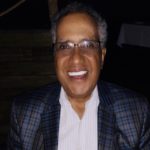
Paul King is a construction consultant and member of Chicago’s Business Leadership Council


